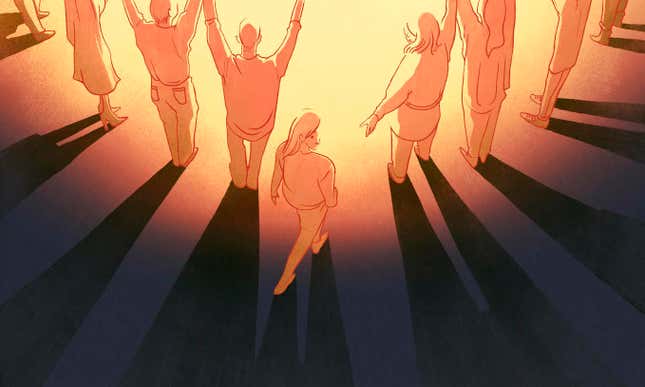This Is a Good Story About Growing Up Evangelical
Latest

Plenty of people didn’t realize the church was a church, even when they drove past it on Algonquin Road, even when the sign was put out front with enormous lettering, even when Christmas came. They thought it was a community college, maybe, or they didn’t think about it all other than when they got stuck in traffic at the corner of Algonquin and Barrington Roads. It was big enough to be a community college. I learned to drive on its generous parking lot. I met my best friends in its walls, which were adorned neither with religious art nor a single cross. It looked like a community college. It was one of the largest megachurches in America.
I had two homes growing up, and Willow Creek Community Church was one of them. It was large but I knew it well and felt for it the kind of affection that grow in time and youth. I grew up evangelical, and good things happened, and this is the story of that.
The house I grew up in was warm. Literally—our California-native mother never let the heat drop below 70 during Chicago winters—but also metaphorically. It was the kind of house that made me feel welcome in my fears and failures, like I belonged to people who knew me and loved me too. That house had the qualities of God in that sense, and I knew that God was real and active and good just as much as I knew that house on Eisenhower Circle would be a blast of heat on a cold day.
Some of my friends had strict parents; some didn’t. Some weren’t allowed to watch television that didn’t have a positive or wholesome message, and we three kids always gave them shit over that. Some could only listen to Christian radio stations or Christian albums. I watched Psycho when I was nine, and my younger sister had most of The Simpsons memorized by the time she was in sixth grade, and our younger brother loved Jimi Hendrix’s electric guitar version of the national anthem. We were weird kids, but we weren’t weird in the way that people think of when they think of evangelicals. Just regular weird.
There are gifts that come with being raised evangelical. They are strange and specific gifts, often marked by their inverse in ways I could only see later: The strong sense of community, when beheld from another angle, was exclusive. The inclusion of women at the highest levels of the church never went far enough. Self-awareness was valued in a way that prized the individual over the community. These were the gifts of the evangelical church, and I received them with open hands because that is what any child does and also because I wanted them, and they were there for the taking.
My dad was finishing seminary when I was born and brought home to a bungalow on Madison Street in Pasadena, in southern California. We moved to suburban Chicago when I was nine; my sister, seven; my brother, five. We went to school for a little while without the right coats because no one in southern California knew that you needed more than a warm jacket for Chicago winters. During those long winters, those weeks when playing outside wasn’t an option for three young kids because the temperatures were in the single digits, you could find us in one of two places: in our red-roofed home on Eisenhower Circle, or at church. When we were at home, we read books and ate Beef Stroganoff Hamburger Helper for dinner and played pranks on each other. When we were at church, we played with our friends and ate in the food court—a church with 17,000 weekly attendees has to have a place to feed them—and made prank phone calls from our dad’s office.
You can’t go to a big evangelical church for too long—more than a couple of weeks—without being asked to join a small group, or a Bible study, or a life group. The names are slightly different according to the churches, but the idea remains the same, that it is better to go through life’s peaks and valleys together than alone. I have been in some form of a small group since I was nine years old. Then, it was a group of fourth-graders who called themselves the Orange Team and tried to memorize Bible verses; now, it is a group of women who live in San Francisco and are married and talk about work and children. There is a verse in Psalm 133 that says, “How very good and pleasant it is when kindred live together in unity!” Doesn’t that sound good?
-

-

-

-

-

-

-

-

-

-

-

-

-

-

-

-

-

-

-

-

-

-

-

-

-

-

-

-

-

-

-

-

-

-

-

-

-

-

-

-








































